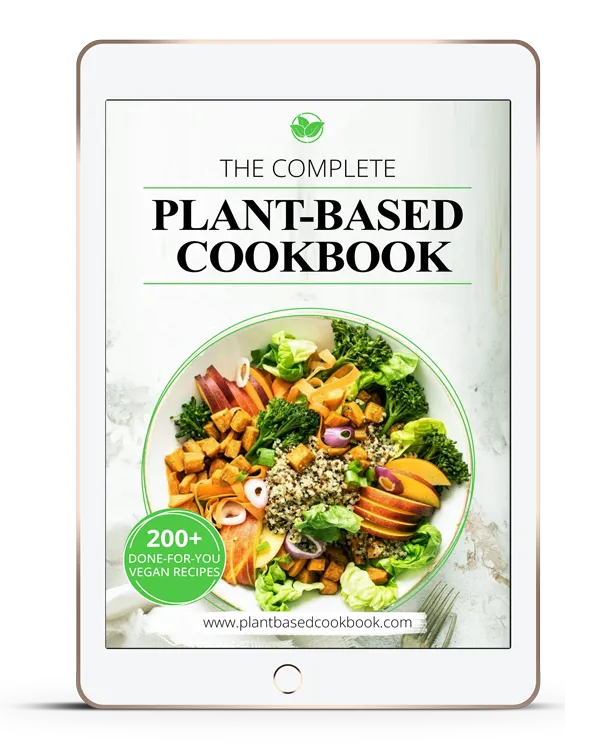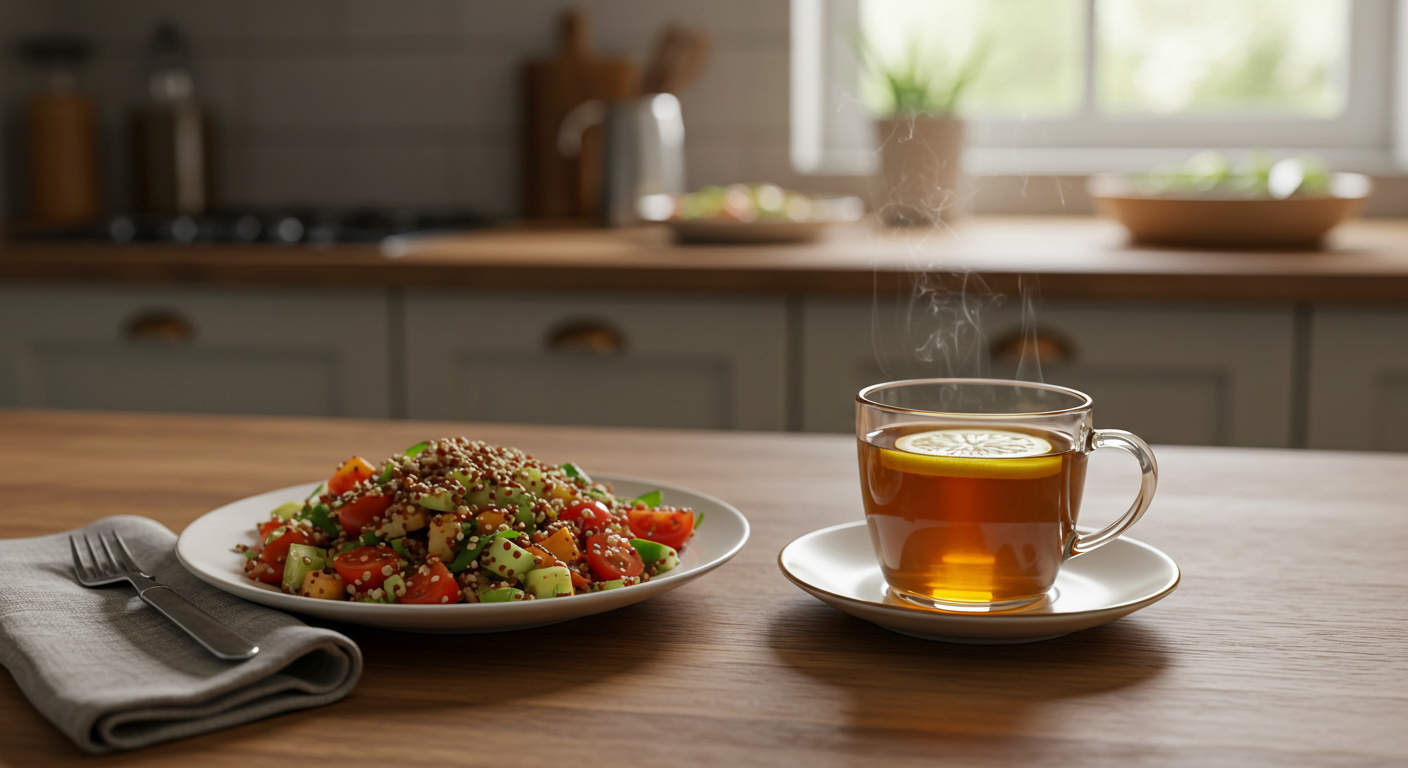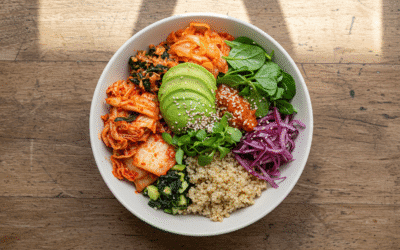Feeling heavy after meals can quickly turn what should be an enjoyable experience into hours of discomfort. That sluggish, weighed-down sensation, often accompanied by bloating or a foggy mind, is your body’s way of signaling that digestion isn’t quite running smoothly. The good news is, you don’t have to resign yourself to this feeling. With a few simple, mindful changes in your daily routine and eating habits, you can help your digestive system work more efficiently and enjoy meals without that uncomfortable heaviness afterward.
1. Start meals with a bitter
Bitters — such as arugula, dandelion greens, radicchio, or even a few drops of digestive bitters tincture — are powerful allies in digestion. They stimulate the production of digestive enzymes and bile, which are essential for breaking down fats and proteins effectively. When you kick off your meal with a small serving of bitter greens or a sip of warm lemon water with a dash of bitters, you prime your digestive system to handle the upcoming food more efficiently. This can significantly reduce the feeling of heaviness later on.
How to incorporate: Try sipping on a small glass of warm lemon water with a few drops of digestive bitters about 15 minutes before your meal. Or add a handful of arugula or other bitter greens as a simple salad starter to awaken your digestion naturally.
2. Eat mindfully, not quickly
We often eat in a rush — distracted by phones, computers, or busy schedules — which leads to shallow chewing and swallowing more air. Eating too fast can overload your stomach, making digestion more difficult and increasing the chance of swallowing excess air, which contributes to bloating and that heavy, uncomfortable sensation.
Mindful eating tips: Put your fork down between bites, chew each mouthful thoroughly (aim for 20-30 chews), and focus on the flavors and textures of your food. This practice slows down your eating pace, aids mechanical digestion in your mouth, and signals to your brain that you’re full, preventing overeating.
3. Go for a light walk after meals
Physical movement stimulates your digestive tract and promotes the smooth transit of food through your intestines. Sitting or lying down immediately after eating can slow digestion, leading to feelings of heaviness and bloating.
A gentle 10–15 minute walk after meals gets your blood flowing and activates the muscles in your abdomen, helping to move food along efficiently and reducing post-meal sluggishness. You don’t need an intense workout — even a casual stroll around your home, neighborhood, or office works wonders.
4. Avoid drinking too much liquid while eating
While staying hydrated is important, drinking large amounts of water or other beverages during meals can dilute your stomach acid. Stomach acid is critical for breaking down proteins and activating digestive enzymes. When it’s diluted, digestion slows down, which can cause bloating and that heavy feeling.
Try this instead: Sip small amounts of water if needed during your meal, but aim to hydrate mainly before and after eating. If you want something warm and soothing with your meal, ginger tea is an excellent option — it supports digestion without interfering with stomach acid.
5. Balance your plate
Your meal’s composition can greatly affect how heavy you feel afterward. Meals rich in refined carbohydrates or high in unhealthy fats often cause sluggishness and digestive discomfort.
To avoid this, aim for balanced meals that include:
- Plenty of fiber from vegetables, which adds bulk and supports healthy gut motility.
- Moderate, quality protein like chicken, fish, tofu, or legumes, which keeps you full and supports muscle health.
- Healthy fats from sources like olive oil, avocado, nuts, or seeds, which aid nutrient absorption and provide lasting energy.
If you notice that dairy or gluten make you feel off, try limiting or eliminating these to see if your digestion improves.
6. Try magnesium after dinner
Magnesium is a mineral that supports muscle relaxation throughout your body — including the muscles in your digestive tract. Supplementing with magnesium can ease cramping, bloating, and constipation that often accompany that heavy, sluggish feeling.
Recommended option: Nature Made Magnesium is a gentle, widely available supplement that many find helpful. Taking magnesium after dinner can promote smooth digestion overnight, helping you feel lighter the next day.

7. Watch food combinations
Sometimes it’s not just what you eat but how you combine foods that affects digestion. Heavy proteins paired with starchy carbs can overload your digestive system, leading to the “food coma” effect.
Experiment with simplifying your meals. For example, try pairing roasted vegetables with quinoa or grilled fish with a leafy salad, rather than combining heavy meats and dense carbs in the same plate. This can reduce digestive stress and improve how you feel after eating.
Extra tips to support digestion
- Manage stress: Chronic stress negatively impacts digestion by interfering with gut motility and enzyme production. Daily practices like meditation, deep breathing, or gentle yoga can make a big difference.
- Stay hydrated: Drinking enough water throughout the day helps keep your digestive system moving smoothly.
- Include probiotics and fermented foods: Yogurt, kefir, kimchi, and sauerkraut promote healthy gut bacteria that aid digestion and reduce bloating.
- Regular movement: Consistent physical activity supports digestion beyond just post-meal walks.
Why these small changes matter
Feeling heavy after meals isn’t something you have to live with or accept as “normal.” It’s a sign your digestion could use some support, and the good news is that many causes can be addressed with simple lifestyle tweaks.
By starting meals with bitters, slowing down your eating pace, balancing your plate, and moving gently after meals, you give your digestive system exactly what it needs to work efficiently. Add in hydration awareness, magnesium support, and mindful food combinations, and you’re setting yourself up for lighter, more comfortable digestion and more enjoyable meals.
Interested in learning more about keeping your gut healthy? Check out our post on Gut health for beginners: changes that make a big impact for more simple tips to support digestion and overall wellness.






